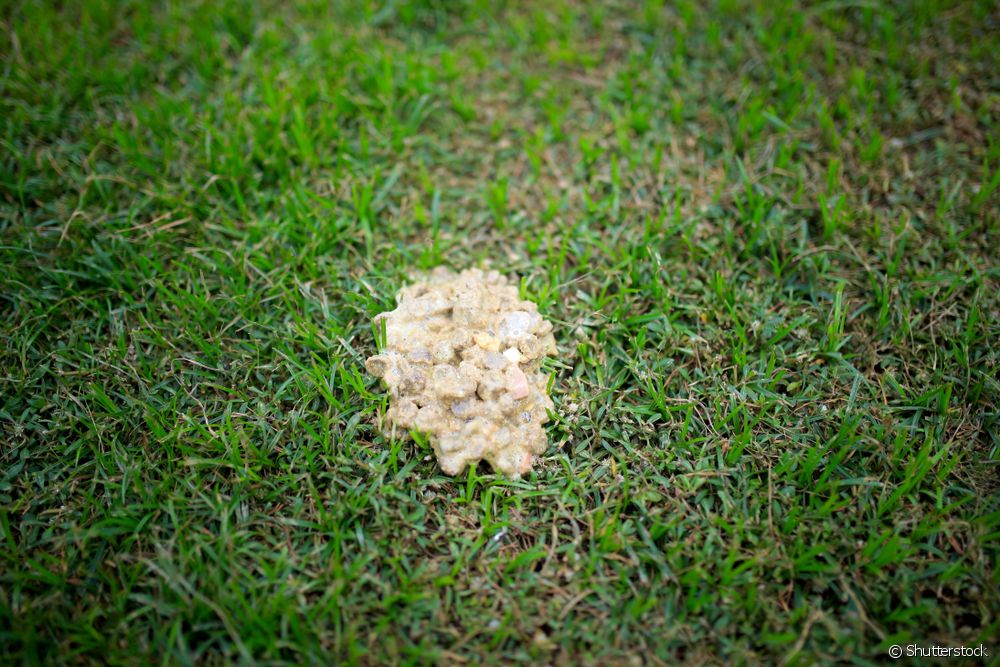Dog vomiting food? Find out what the problem indicates and what to do

Table of contents
Just like other general symptoms (fever, for example), dog vomiting can be just simple indigestion or a more serious illness. Each type of vomiting usually points to a different cause, and one of them is dog vomiting: it usually has a brown color, with pieces of chewed food or the cake of dough that forms in the animal's digestive tract. To help you toTo understand what causes this type of vomiting and what it can mean, we talked to veterinarian Rafael Machado, general practitioner at Vet Popular hospital. Come see!
Dog vomiting food: what can cause the problem?
Among the different types of vomiting, vomiting with food has a very small probability of being something very urgent (it is different from vomiting with blood, for example). Still, it should draw your attention: "Vomiting with food is an inexpressive symptom, but it can never be underestimated. It can be caused by a bacterial or physiological viral change, illness, too fatty food, indigestion or...",even if the animal has become very agitated after eating," explains Rafael.
Another very common cause for vomiting food is accelerated feeding: "the dog can end up vomiting if he eats too fast and even develop some pathologies because of it. For example, if the animal eats and runs out to play soon after, he can end up suffering a gastric torsion, common in large and giant animals ", said the professional. It is important to pay attentionin this practice, especially with larger animals, which tend to eat very quickly.

Dog vomiting: what to do with the animal after that?
As it is difficult to determine the reason by analyzing only the vomit, the best thing you can do when you notice that your friend is experiencing this difficulty is to keep an eye on his behavior. The veterinarian explains: "Observe the amount of vomit and whether the animal has become interested in food and water after expelling the food. If he continues to vomit, the ideal is to go to a veterinary hospitalso that the doctor can get in with some medication: never wait for your pet to get worse!" Even if it should be a cause for attention, isolated vomiting is not so worrying: seeking medical help should happen when it becomes frequent.
In the office, in addition to examining the animal, it is common for the veterinarian to order some more specific tests that will help in an accurate diagnosis: "an abdominal ultrasound and a blood test are ordered to differentiate whether the vomiting was caused by an isolated reason, such as something the animal ate, or a more serious pathology, such as endocrine changes or inflammation in the intestine", he explains.Rafael, without the vet's recommendation, it's best not to do anything when your dog vomits: home remedies for vomiting dogs or any other type of medication can make your friend's situation worse, since you don't know what the cause is yet.

What to do when the dog vomits from eating too fast?
Anxiety and agitation can be the great villains in the story of your dog vomiting food. At least, that's what happened to Amora: Ana Heloísa, guardian of this shiny-haired doguinha, told how she solved the problem with her. Check it out: "Amora has always been very greedy, but sometimes she has anxiety spikes to eat even faster than normal. It happened for a few daysAfter I adopted Mia, my cat, even though she showed no interest in eating Amora's food, she started to eat faster to prevent the cat from trying to eat. Since Amora had never shown any symptoms of gastritis or any other stomach complication before, the veterinarian figured it was due to the speed of eating. I started to give the food divided into smaller portions, inside a container.toys that require her to roll to drop the grain, so she eats more slowly." You can find this type of toy for the rushed dog easily in pet shops: talk to your vet to find out which model is best for your friend!
See_also: Ragdoll: care, personality and curiosities... Learn more about this breed of giant catsSee_also: Tick-borne disease: symptoms, treatment, is it curable... All about the parasite in dogs!

